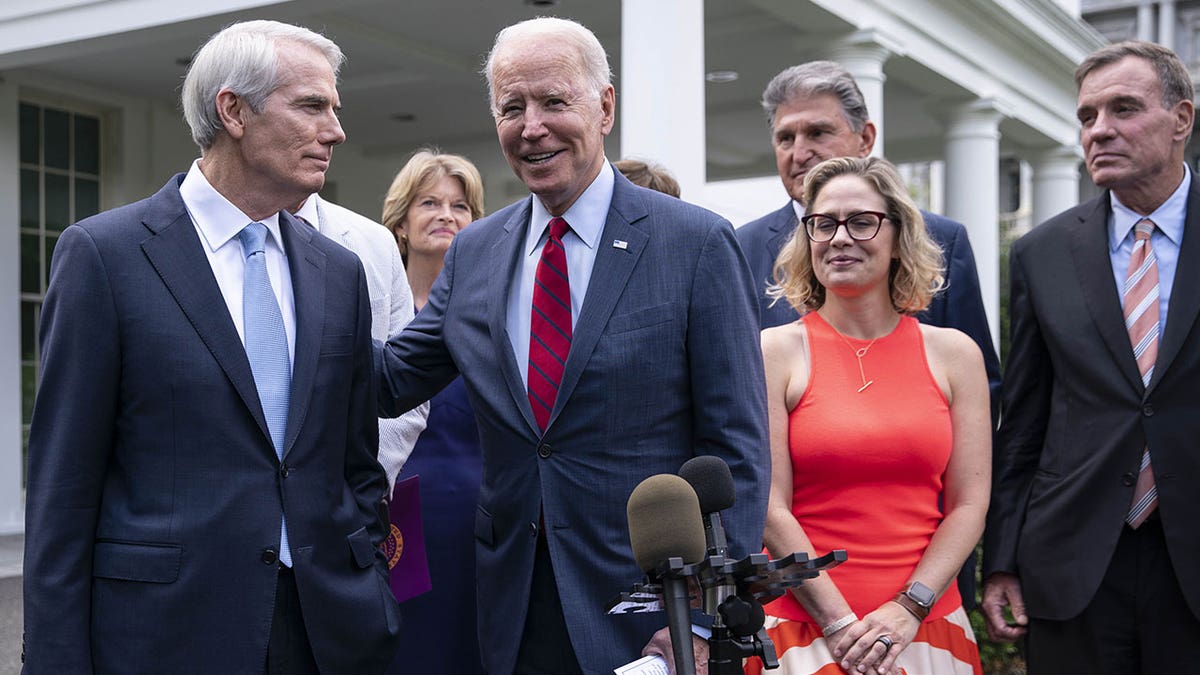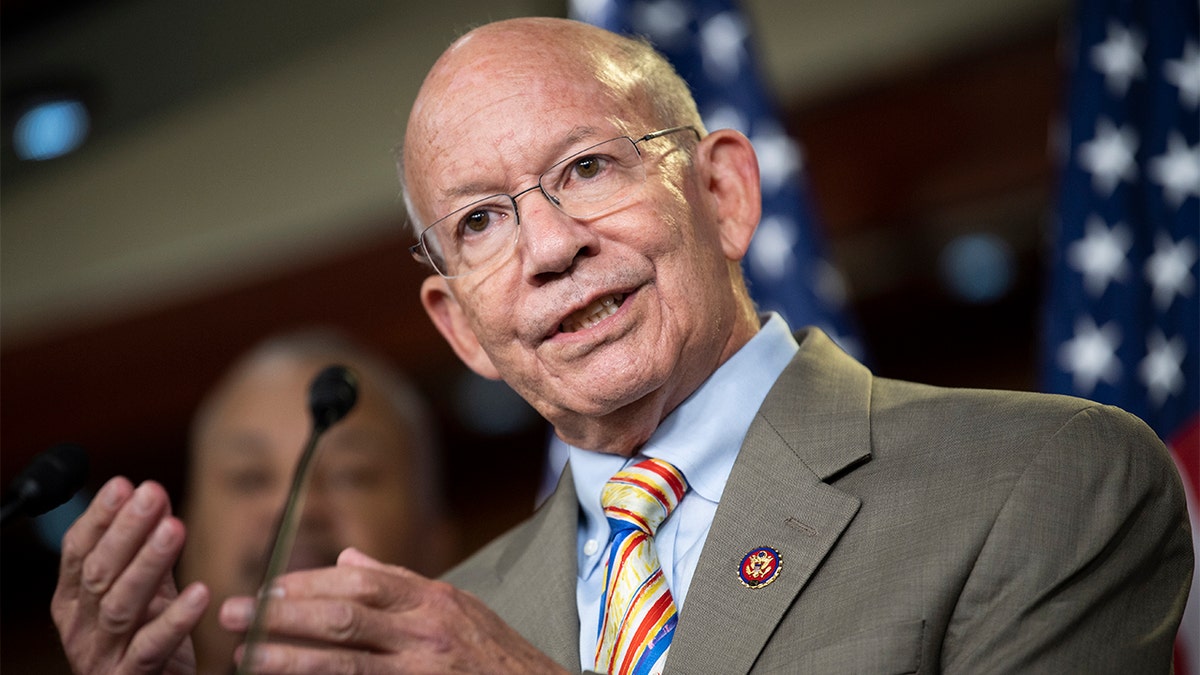Sen. Josh Hawley says he is 'disappointed' that anybody would support infrastructure bill
Missouri Republican voices his concerns over the bipartisan Senate bill on 'Fox News Primetime'
The Senate passed the $1 trillion-plus bipartisan infrastructure bill Tuesday, meeting a goal that lawmakers have been reaching toward for months.
It was a victory for the moderate senators who led the effort, especially Sens. Rob Portman, R-Ohio, and Kyrsten Sinema, D-Ariz. It was a victory for President Biden, who was urging Republicans and Democrats to compromise on infrastructure, and endorsed the legislation.
It was a victory for Majority Leader Chuck Schumer, D-N.Y., who hurried senators along when their negotiations seemed stalled. And it could even be considered a victory for Minority Leader Mitch McConnell, R-Ky., who will unfailingly point to this bill every time Democrats start agitating to get rid of the legislative filibuster.
But it is by no means a layup at this point to make it to Biden's desk – the bipartisan infrastructure bill faces a rocky path through the House of Representatives with a litany of potential pitfalls.

President Biden with the senators behind the bipartisan infrastructure bill. Negotiations were led by Sens. Rob Portman, R-Ohio, (left) and Kyrsten Sinema, D-Ariz., (middle right). (Sarah Silbiger/UPI/Bloomberg via Getty Images)
Chief among them is the fact House Speaker Nancy Pelosi, D-Calif., has sworn up and down she will not touch the infrastructure bill until the Senate gives her Democrats' $3.5 trillion spending wish list under budget reconciliation.
Asked last week if she will hold the infrastructure bill until she gets a reconciliation package, Pelosi responded, "What do you think?"
"Yes," the speaker added, when asked – perhaps unnecessarily – to clarify.
"We're going to do it when we can do it all," she also said last week.
Rep. Alexandria Ocasio-Cortez, D-N.Y., also said she is not excited about the bipartisan Senate bill and will hold it hostage to a large reconciliation bill. She is particularly influential with progressive young Democratic lawmakers, many of whom may follow her vote.
INFRASTRUCTURE BILL'S UNUSUAL PROVISIONS: DRUNK DRIVING TECH MANDATE TO ‘POLLINATOR-FRIENDLY’ ROADS
"If there is not a reconciliation bill in the House and if the Senate does not pass a reconciliation bill, we will uphold our end of the bargain and not pass the bipartisan bill until we get all of these investments in," Ocasio-Cortez said on CNN's "State of the Union." She added that the contents of the bipartisan bill "are not all, you know, Candyland. There are some of these political pay-fors that are very alarming."
Rep. Peter DeFazio, D-Ore., the chairman of the House Infrastructure Committee, also says he's unhappy with the Senate infrastructure bill. DeFazio was the driving force behind the House's own infrastructure bill it passed earlier this year. But the Senate simply jettisoned all of his work and placed its own bill in DeFazio's legislative vehicle – something the veteran legislator is vocally frustrated about.

Rep. Peter DeFazio, D-Ore., speaks during a news conference on the INVEST in America Act in Washington on Wednesday, June 30, 2021. DeFazio has made his frustration with Senate moderates' infrastructure plan clear. (Photo by Caroline Brehman/CQ-Roll Call, Inc via Getty Images) (Photo by Caroline Brehman/CQ-Roll Call, Inc via Getty Images)
"This was written by three people who have no knowledge of nor expertise in transportation infrastructure," DeFazio said of Portman, Sinema and Sen. Susan Collins, R-Maine, last week. He also expressed distaste for Biden adviser Steve Ricchetti, who worked alongside the senators to draft the bill.
"Biden said he wanted a bill that dealt meaningfully with climate change… This is not that bill," DeFazio added.
And reconciliation is not certain to pass the Senate. The $3.5 trillion proposal is going to be a tough pill for moderate Democrats to swallow. Sinema already said she doesn't support it in its current form.
"After reviewing the Senate Budget Committee’s outline, I have told Senate leadership and President Biden that I support many of the goals in this proposal," she said in a statement last month. "I have also made clear that while I will support beginning this process, I do not support a bill that costs $3.5 trillion."
If Sinema forces the price tag of the Senate bill down, it could anger not just House Democrats but also progressive senators like Sen. Bernie Sanders, I-Vt. That might cause him or others in his wing of the party to vote against the bill, preventing it from getting to the House.
Schumer has to thread the needle on reconciliation to please Democratic moderates and progressives in both chambers.
Yet another House group isn't particularly excited about the bipartisan bill: conservative Republicans. They dislike the bill largely because they believe the pay-fors are not robust enough.
"The pay-fors don’t pay for!" The Republican Study Committee (RSC) tweeted after a Congressional Budget Office (CBO) report projected that the bill's revenue raisers will only cover about half of its spending. RSC Chairman Rep. Jim Banks, R-Ind., called the bill "Green New Deal Lite" and urged his members to vote against it.
The bill is also rife with billions in other questionable spending, including money for pollinator-friendly roadsides, a mandate for a report on how to improve stoned-driving studies, and even a requirement that all new cars track their drivers' blood alcohol concentration. Those are unlikely to go over well with conservatives.
If there is one group that could prove key to the infrastructure bill passing, however, it's the House Problem Solvers Caucus, a group of moderate Democrats and Republicans in the chamber.
The Senate infrastructure bill "is a really pragmatic solution. It's something that we all support," Rep. Brian Fitzpatrick, R-Pa., said at a press conference this month. "We want it to be brought here as a standalone vote."
"This bipartisan infrastructure package will help create jobs, build our economy, address our climate, enable us to compete and deliver on what the Problem Solvers Caucus really is all about," added Rep. Josh Gottheimer, D-N.J., at the same press conference, flanked by more than a dozen other lawmakers.
Gottheimer and a handful of moderate Democrats are circulating a letter to Pelosi demanding a vote on the infrastructure bill independent of any Senate action on reconciliation.
"After years of waiting, the country cannot afford unnecessary delays to finally deliver on a physical infrastructure package," the letter says. "As soon as the Senate completes its work, we must bring this bipartisan infrastructure bill to the House floor for a standalone vote."
Transportation Secretary Pete Buttigieg, meanwhile, has not explicitly taken a side on how the House should handle the infrastructure bill. But he's seemed to imply in recent TV appearances that the legislation deserves consideration separate from the reconciliation package.
CLICK HERE TO GET THE FOX NEWS APP
"These are two separate packages but they're definitely both part of the president's vision. But at risk of sounding simplistic, I would encourage legislators to vote for policies that they think are good and vote against the policies they disagree with," Buttigieg said on "Fox News Sunday." "My hope is that this will be voted on on its merits."
"This is good policy and it's good funding," he added on CNN Wednesday. "What we're talking about here represents the most significant infrastructure funding that we've done in my lifetime and then some."
The Senate passed the budget resolution early Wednesday morning, which is just the beginning of what is likely to be a long and arduous process of writing and actually passing Democrats' massive infrastructure package, a process that is likely to bleed deep into the fall.
Fox News' Caroline McKee, Chad Pergram, Kelly Phares and Jason Donner contributed to this report.















































